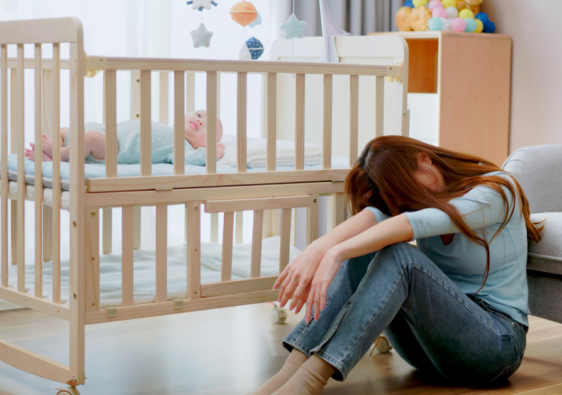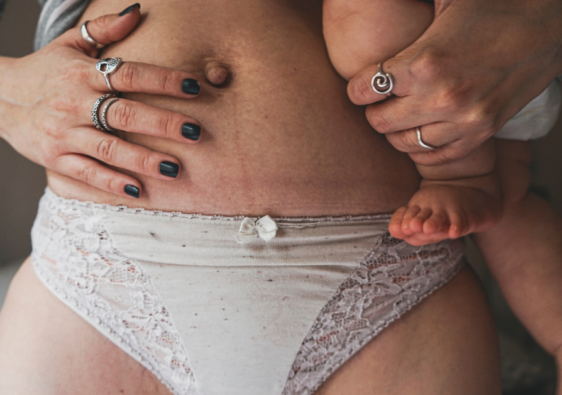As a mother who’s been through the trenches of postpartum sleep deprivation, I can tell you it’s an experience that catches many new parents off guard. The intensity and persistence of exhaustion in those early weeks and months can be overwhelming.
This isn’t your typical tiredness – it’s a whole new level that impacts every aspect of your life.
When you bring your newborn home, you quickly realize your sleep patterns are about to undergo a dramatic shift. Those blissful nights of uninterrupted rest become a distant memory as you adjust to your baby’s round-the-clock needs. But take heart – you’re not alone in this, and there are ways to navigate this sleep-deprived terrain.
Understanding the Sleep Deprivation Cycle
The postpartum period creates a perfect storm for sleep disruption. Your body is recovering from childbirth, hormones are fluctuating wildly, and you’re learning to care for a tiny human who has no concept of day or night.
Let’s break down what’s really happening:
Biological Factors at Play
Your body’s circadian rhythm, which regulates your sleep-wake cycle, gets thrown completely off balance. Melatonin production, crucial for initiating sleep, becomes erratic.
Meanwhile, cortisol levels, typically highest in the morning to help you wake up, can spike at odd hours because of stress and irregular sleep patterns.
Prolactin, the hormone responsible for milk production, tends to peak during the night. This biological drive to be alert for feeding can make it difficult to fall back asleep after nighttime nursing sessions.
Many mothers find themselves wide awake even when their babies are sleeping.
Practical Challenges
Beyond the hormonal rollercoaster, there are practical aspects that contribute to sleep deprivation:
Frequent nighttime feedings disrupt your sleep cycles. Newborns typically need to eat every 2-3 hours, which means you’re up many times throughout the night.
Diaper changes at all hours are another sleep-interrupting necessity. A wet or soiled diaper can wake a baby (and consequently, you) at any time.
Soothing a fussy or colicky baby can lead to long periods of wakefulness. Some babies struggle with gas, reflux, or general discomfort, requiring extended periods of comforting.
Anxiety about the baby’s well-being often keeps new parents on high alert. You might find yourself checking on the baby frequently or having trouble relaxing enough to fall asleep.
These interruptions lead to fragmented sleep, which research shows can be just as detrimental as getting fewer total hours of sleep. Your body never gets the chance to cycle through all the necessary stages of sleep, leaving you feeling unrefreshed even after seemingly adequate time in bed.
The Impact of Sleep Deprivation on New Parents
The effects of chronic sleep loss during the postpartum period can be far-reaching and impact many aspects of your life:
Cognitive Function
Sleep deprivation significantly impairs your cognitive abilities. You might find yourself forgetting simple things, like where you put your keys or what day of the week it is.
Concentrating on tasks becomes challenging, and decision-making abilities are compromised.
Studies have shown that sleep deprivation can impair cognitive function to a level equivalent to being legally drunk. This can affect your ability to perform daily tasks safely and efficiently, from driving to caring for your baby.
Emotional Regulation
Lack of sleep makes it harder to manage your emotions. You might find yourself more irritable, prone to mood swings, or struggling with feelings of overwhelm.
Small inconveniences that you’d normally brush off can feel like major catastrophes.
This emotional volatility can strain relationships with your partner and other family members. You might snap at loved ones more easily or have trouble communicating effectively.
Physical Health
Your body needs sleep to recover and function properly. Chronic sleep deprivation can lead to a weakened immune system, making you more susceptible to colds, flu, and other illnesses.
This is particularly concerning for new mothers who are already dealing with the physical recovery from childbirth.
Sleep deprivation can also affect your metabolism, potentially contributing to postpartum weight retention. It can increase cravings for high-calorie, sugary foods as your body seeks quick energy sources to combat fatigue.
Mental Health Risks
Perhaps most concerning is the link between sleep deprivation and postpartum mood disorders. Research shows that new mothers who experience severe sleep deprivation are at a higher risk of developing postpartum depression and anxiety.
Lack of sleep can exacerbate feelings of sadness, hopelessness, or excessive worry that are common in the postpartum period. It can also make it harder to cope with the stress and challenges of new parenthood.
Strategies for Coping with Postpartum Sleep Deprivation
While completely avoiding sleep deprivation might not be possible, there are strategies you can employ to mitigate it’s effects:
Prioritize Sleep Whenever Possible
The old adage ‘sleep when the baby sleeps’ exists for a reason. While it’s tempting to use naptime to catch up on chores or scroll through social media, prioritizing sleep can make a significant difference in your overall well-being.
Try to resist the urge to “get things done” during every moment your baby is asleep. Instead, use at least some of those periods to rest yourself.
Even if you can’t fall asleep, lying down and closing your eyes can be restorative.
Share Nighttime Duties
If you have a partner, consider taking shifts for nighttime care. This allows each of you to get a longer stretch of uninterrupted sleep.
For example, one person might handle everything from 8 PM to 2 AM, while the other takes over from 2 AM to 8 AM.
If you’re breastfeeding, your partner can still help by bringing the baby to you for feedings and handling diaper changes. This minimizes the amount of time you need to be fully awake and makes it easier to fall back asleep.
Create a Sleep-Friendly Environment
Make your bedroom as conducive to sleep as possible. Use blackout curtains to block out light, which can interfere with your body’s natural sleep-wake cycle.
A white noise machine can help mask sudden noises that might wake you or the baby.
Invest in comfortable bedding that helps regulate your body temperature. Being too hot or too cold can disrupt sleep, so choose breathable fabrics and adjust your room temperature as needed.
Consider keeping the baby’s sleeping area close but separate to minimize disruptions. A bassinet or co-sleeper next to your bed can make nighttime feedings more convenient while still allowing for some separation.
Practice Good Sleep Hygiene
Even with a newborn, try to establish some semblance of a bedtime routine. This can help signal to your body that it’s time to wind down and prepare for sleep.
Avoid screens before bed, as the blue light emitted by phones, tablets, and computers can interfere with melatonin production. If you need to check your phone for baby-related apps or alarms, use a blue light filter or night mode.
Limit caffeine intake, especially in the afternoon and evening. While it might be tempting to rely on coffee to get through the day, consuming caffeine too late can make it harder to fall asleep when you do get the chance.
Try relaxation techniques like deep breathing, gentle stretching, or progressive muscle relaxation. These can help calm your mind and body, making it easier to fall asleep quickly when the opportunity arises.
Accept Help
Don’t be afraid to accept offers of help from family and friends. Whether it’s watching the baby while you nap or helping with household chores, every little bit can make a difference in your ability to rest.
If you have the means, consider hiring a postpartum doula or night nurse for a few nights. These professionals can provide overnight care for your baby, allowing you to get some much-needed uninterrupted sleep.
Navigating Controversial Sleep Practices
There are several controversial topics surrounding infant sleep and parental rest. It’s important to approach these with an open mind and make decisions based on what works best for your family:
Co-Sleeping vs. Separate Sleeping
Co-sleeping, where the baby sleeps in the same bed as the parents, is a practice that sparks heated debate. Some parents find that co-sleeping allows for easier nighttime feedings and more rest for everyone.
They argue that it promotes bonding and helps regulate the baby’s breathing and temperature.
On the other hand, many pediatric organizations recommend against bed-sharing due to the increased risk of Sudden Infant Death Syndrome (SIDS) and accidental suffocation. They advocate for room-sharing, where the baby sleeps in a separate crib or bassinet in the parents’ room.
Both approaches have pros and cons, and what works best can vary from family to family. If you’re considering co-sleeping, it’s crucial to research safe co-sleeping practices and discuss the risks and benefits with your pediatrician.
Sleep Training Methods
Sleep training is another area of controversy in the parenting world. There are various sleep training methods, ranging from “cry it out” approaches to gentler, gradual methods.
Proponents of sleep training argue that it helps babies learn to self-soothe and sleep for longer stretches, ultimately benefiting both the baby and parents. Critics worry about the potential stress on the baby and the impact on parent-child attachment.
Some popular sleep training methods include:
- The Ferber Method (Graduated Extinction): This involves letting the baby cry for short, gradually increasing intervals before briefly comforting them.
- The Chair Method: A parent sits in a chair next to the crib, gradually moving the chair further away over several nights.
- The Pick-Up-Put-Down Method: Parents pick up the baby when they cry, soothing them until they’re calm, then putting them back down awake.
- The Fading Method: Parents gradually decrease their involvement in the baby’s sleep routine over time.
These can be contentious topics, and it’s essential to research thoroughly and talk to your pediatrician before implementing any sleep training method. What works for one family may not work for another, and it’s okay to adjust your approach based on your baby’s needs and your parenting philosophy.
Use of Sleep Aids
The use of sleep aids, both for infants and parents, can be controversial. For babies, products like swings, rockers, or devices that claim to help babies sleep longer are popular but come with safety concerns.
The American Academy of Pediatrics recommends against using any sleep positioners or wedges due to the risk of suffocation.
For parents, over-the-counter or prescription sleep medications might seem tempting but can be risky, especially if you’re breastfeeding. Some sleep aids can affect your ability to wake up and respond to your baby’s needs.
Always talk to a healthcare provider before using any sleep-promoting products or medications, especially if you’re breastfeeding. They can help you weigh the risks and benefits and suggest safer alternatives if needed.
Long-Term Strategies for Better Sleep
As your baby grows, you can start implementing strategies for more consistent sleep:
Establish a Bedtime Routine
Creating a consistent bedtime routine can help signal to both you and your baby that it’s time to wind down. This might include activities like a warm bath, reading a story, or gentle massage.
Start the routine at the same time each night, even if your baby doesn’t always fall asleep right away. Consistency helps reinforce your baby’s natural circadian rhythm.
Keep the routine calm and quiet. Avoid stimulating activities or bright lights close to bedtime.
This can help promote the production of melatonin, the sleep hormone.
Gradually Extend Sleep Stretches
Work on gradually extending the time between nighttime feedings, if your pediatrician agrees it’s appropriate. This can help both you and your baby get longer stretches of sleep.
During the day, try to keep your baby awake for slightly longer periods between naps. This can help consolidate nighttime sleep as your baby gets older.
If you’re breastfeeding, consider pumping so that your partner can take a nighttime feeding. This allows you to get a longer stretch of uninterrupted sleep.
Consider Sleep Training When Appropriate
Around 4-6 months, many babies are developmentally ready for some form of sleep training. This doesn’t necessarily mean “cry it out” methods – there are gentler approaches that can help your baby learn to self-soothe.
Research different methods and choose one that aligns with your parenting philosophy and your baby’s temperament. Be prepared to be consistent – sleep training typically takes at least a few weeks to show results.
Remember that every baby is different. What works for you might not work for another, so be prepared to adjust your approach as needed.
Create a Sleep-Conducive Environment
Make sure your baby’s sleep environment is conducive to rest. Keep the room dark and at a comfortable temperature (around 68-72°F is often recommended).
Use a white noise machine or fan to create consistent background noise. This can help mask sudden sounds that might wake your baby.
Consider using a sleep sack instead of loose blankets, which can be a safety hazard for young babies.
Pay Attention to Daytime Habits
Your baby’s daytime routine can significantly impact nighttime sleep. Ensure your baby is getting enough stimulation and activity during the day.
Try to expose your baby to natural light during the day, especially in the morning. This helps regulate their circadian rhythm.
Be mindful of late afternoon naps. As your baby gets older, you might need to adjust nap times to confirm they’re tired enough at bedtime.
The Light at the End of the Tunnel
Remember, postpartum sleep deprivation is a phase – albeit a challenging one. As your baby grows and develops, sleep patterns will improve.
Most babies start sleeping for longer stretches by 3-6 months, with many sleeping through the night by their first birthday.
In the meantime, be kind to yourself. Prioritize rest when you can, and don’t hesitate to reach out for support when you need it.
Whether it’s asking a friend to watch the baby while you nap or talking to your doctor about your struggles, seeking help is a sign of strength, not weakness.
Frequently Asked Questions
How long does postpartum sleep deprivation last?
The duration of postpartum sleep deprivation varies for each family. Most parents start to see improvements in their sleep around 3-4 months postpartum, but it can take up to a year or more for sleep patterns to fully stabilize.
Can lack of sleep affect milk production?
While lack of sleep doesn’t directly reduce milk production, it can indirectly impact breastfeeding. Fatigue can increase stress hormones, which may interfere with let-down reflex and make breastfeeding more challenging.
Is it safe to co-sleep with my newborn?
Co-sleeping safety is a controversial topic. While some cultures practice it widely, many pediatric organizations advise against it due to increased SIDS risk.
If you choose to co-sleep, research safe co-sleeping practices and discuss with your pediatrician.
When can I start sleep training my baby?
Most experts recommend waiting until your baby is at least 4-6 months old before starting any sleep training. At this age, babies are developmentally ready to learn self-soothing techniques.
How can I help my partner cope with sleep deprivation?
Supporting your partner through sleep deprivation involves sharing nighttime duties, encouraging naps when possible, and being understanding of mood changes. Consider taking shifts or alternating nights to confirm both parents get some uninterrupted sleep.
What are signs of severe sleep deprivation in new parents?
Severe sleep deprivation can manifest as extreme irritability, difficulty concentrating, memory problems, and even hallucinations. If you’re experiencing these symptoms, it’s important to seek help from your healthcare provider.
Can postpartum sleep deprivation lead to depression?
Yes, there’s a strong link between sleep deprivation and postpartum depression. Lack of sleep can exacerbate feelings of sadness, anxiety, and overwhelm.
If you’re struggling with your mood, reach out to your healthcare provider for support.
Are there any supplements safe for breastfeeding mothers to help with sleep?
Some supplements like magnesium or certain herbal teas may be safe for breastfeeding mothers, but it’s crucial to ask with your healthcare provider before taking any supplements. They can advise on safety and potential interactions with breastfeeding.
How can I fall asleep quickly when my baby finally sleeps?
To fall asleep quickly, try relaxation techniques like deep breathing or progressive muscle relaxation. Keep your bedroom dark and cool, and avoid screens before bed. Some parents find white noise or gentle music helpful for falling asleep.
Is it normal to feel resentful towards my baby due to lack of sleep?
Feeling resentful or frustrated due to sleep deprivation is a common experience for many new parents. These feelings don’t make you a bad parent, but if they persist or intensify, it’s important to seek support from a healthcare provider or therapist.
Key Takeaways
- Postpartum sleep deprivation is a common and challenging experience for new parents.
- The effects of sleep deprivation can impact cognitive function, emotional regulation, physical health, and mental well-being.
- Strategies like sharing nighttime duties, creating a sleep-friendly environment, and accepting help can mitigate the effects of sleep loss.
- Controversial topics like co-sleeping and sleep training should be approached with research and consideration of your family’s unique needs.
- Establishing consistent routines and gradually working towards longer sleep stretches can help improve sleep for both parents and babies over time.



